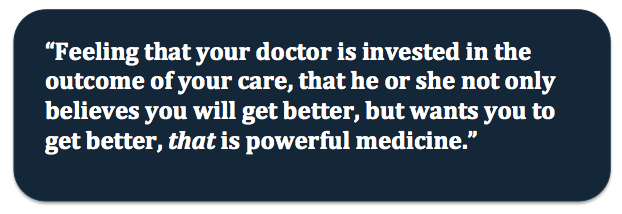Knowing a little Creole goes a long way with patient interaction. Before heading to Haiti round one, I learned the usual travel phrases: my name is, how are you, hello. And while patients smiled a bit more brightly to hear their native tongue spoken by the obvious foreigner, the most effective aspects of language for me did not pertain to connection so much as efficiency. During my first few weeks in Haiti, I learned how to ask about pain, how to give positional commands (eg. lie on your back, roll on your side), and how to ask them to relax. While none of these phrases allowed me to learn about their families, their lives, their dreams, their fears… they did help me to provide the best care that I could in the time that I had.
Additionally, by bypassing my interpreter, I not only saved time, I gained eye contact. When a patient is consistently getting instruction and feedback from your interpreter, they fail to look at you. But when your patient makes eye contact with you, you gain a more personal connection. I believe that communicating in Creole also showed my patients that I was making an effort, not only showing up for a few weeks only to disappear home to what most of them would consider luxury. In learning their language, I was investing in their community, their culture. And this idea, this feeling that your doctor is invested in the outcome of your care, that he or she not only believes you will get better, but wants you to get better. That is powerful medicine.
And then there was Mona. My first trip to Haiti, I had the most interesting patient. As with many patients in Haiti, her story didn’t match up to her presentation one iota. She had fallen out of bed at the age of 16 and since that day had not been able to use her left arm or leg effectively because they would spasm painfully. After an extensive detective question and answer session, the best hypothesis I have is that she had a few seizures as a teenager, the most severe affecting her left extremities. But, I digress…
Beyond being a clinically interesting patient, her eyes and her smile spoke to me. In front of me was a woman (about 30 years old at the time) who has three small children, lives independently, and divorced her husband for reasons we need not discuss (this is nearly unheard of in Haiti). She had strength, not just the kind displayed by her continuously contracting muscles, but mentally… the type of strength that speaks of the good in humanity and our ability to overcome, the kind that I am drawn toward.
After treating her twice, I learned that her oldest daughter had reached school age, but would not be attending because the family had no money. There are only private schools in Port-de-Paix, where we treat, and most families cannot afford them, though the yearly tuition is somewhere around $300 USD/year.
For the last three years, I have been sponsoring Mona’s daughter so that she will receive an education. Each time I am in town, I see Mona and her family. We talk, we connect, but it’s mostly through an interpreter or our eyes. Last week, I was in Haiti for the fifth time and, of course, I saw Mona. But this time was different.
Over the last six months I have been studying; learning Creole words and sounds whenever I get the chance. And this time, THIS time… while our conversation was not complicated and our concepts completely uncerebral, we could talk without a middleman. We could connect at will without having to pull someone over to interpret. And it made me feel more like we were just friends, hanging out, chillin’ like villains, able to talk about the day. It stripped away another layer of separation, the kind that you can’t see and pretend doesn’t exist, but you can feel it… in the silent moments, when your eyes look away because you feel roadblocked and stuck.
by Morgan Denny on May 28, 2015


